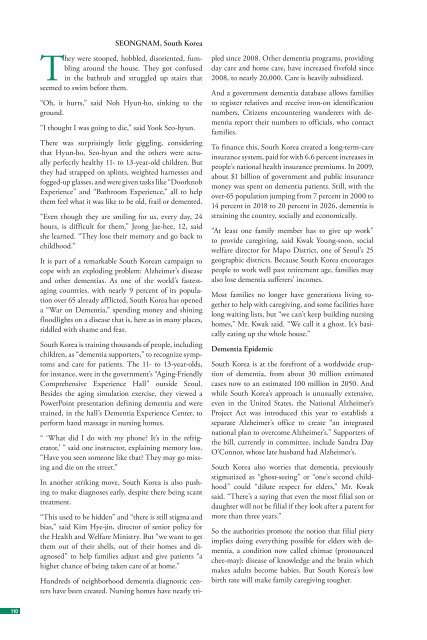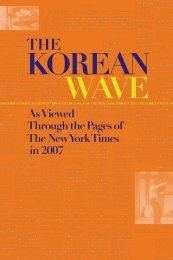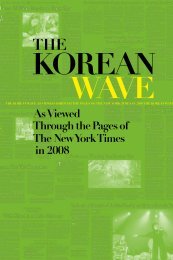The Korean Wave 2010-2011 - Korean Cultural Service
The Korean Wave 2010-2011 - Korean Cultural Service
The Korean Wave 2010-2011 - Korean Cultural Service
You also want an ePaper? Increase the reach of your titles
YUMPU automatically turns print PDFs into web optimized ePapers that Google loves.
SEONGNAM, South Korea<strong>The</strong>y were stooped, hobbled, disoriented, fumblingaround the house. <strong>The</strong>y got confusedin the bathtub and struggled up stairs thatseemed to swim before them.“Oh, it hurts,” said Noh Hyun-ho, sinking to theground.“I thought I was going to die,” said Yook Seo-hyun.<strong>The</strong>re was surprisingly little giggling, consideringthat Hyun-ho, Seo-hyun and the others were actuallyperfectly healthy 11- to 13-year-old children. Butthey had strapped on splints, weighted harnesses andfogged-up glasses, and were given tasks like “DoorknobExperience” and “Bathroom Experience,” all to helpthem feel what it was like to be old, frail or demented.“Even though they are smiling for us, every day, 24hours, is difficult for them,” Jeong Jae-hee, 12, saidshe learned. “<strong>The</strong>y lose their memory and go back tochildhood.”It is part of a remarkable South <strong>Korean</strong> campaign tocope with an exploding problem: Alzheimer’s diseaseand other dementias. As one of the world’s fastestagingcountries, with nearly 9 percent of its populationover 65 already afflicted, South Korea has openeda “War on Dementia,” spending money and shiningfloodlights on a disease that is, here as in many places,riddled with shame and fear.South Korea is training thousands of people, includingchildren, as “dementia supporters,” to recognize symptomsand care for patients. <strong>The</strong> 11- to 13-year-olds,for instance, were in the government’s “Aging-FriendlyComprehensive Experience Hall” outside Seoul.Besides the aging simulation exercise, they viewed aPowerPoint presentation defining dementia and weretrained, in the hall’s Dementia Experience Center, toperform hand massage in nursing homes.“ ‘What did I do with my phone? It’s in the refrigerator,’” said one instructor, explaining memory loss.“Have you seen someone like that? <strong>The</strong>y may go missingand die on the street.”In another striking move, South Korea is also pushingto make diagnoses early, despite there being scanttreatment.“This used to be hidden” and “there is still stigma andbias,” said Kim Hye-jin, director of senior policy forthe Health and Welfare Ministry. But “we want to getthem out of their shells, out of their homes and diagnosed”to help families adjust and give patients “ahigher chance of being taken care of at home.”Hundreds of neighborhood dementia diagnostic centershave been created. Nursing homes have nearly tripledsince 2008. Other dementia programs, providingday care and home care, have increased fivefold since2008, to nearly 20,000. Care is heavily subsidized.And a government dementia database allows familiesto register relatives and receive iron-on identificationnumbers. Citizens encountering wanderers with dementiareport their numbers to officials, who contactfamilies.To finance this, South Korea created a long-term-careinsurance system, paid for with 6.6 percent increases inpeople’s national health insurance premiums. In 2009,about $1 billion of government and public insurancemoney was spent on dementia patients. Still, with theover-65 population jumping from 7 percent in 2000 to14 percent in 2018 to 20 percent in 2026, dementia isstraining the country, socially and economically.“At least one family member has to give up work”to provide caregiving, said Kwak Young-soon, socialwelfare director for Mapo District, one of Seoul’s 25geographic districts. Because South Korea encouragespeople to work well past retirement age, families mayalso lose dementia sufferers’ incomes.Most families no longer have generations living togetherto help with caregiving, and some facilities havelong waiting lists, but “we can’t keep building nursinghomes,” Mr. Kwak said. “We call it a ghost. It’s basicallyeating up the whole house.”Dementia EpidemicSouth Korea is at the forefront of a worldwide eruptionof dementia, from about 30 million estimatedcases now to an estimated 100 million in 2050. Andwhile South Korea’s approach is unusually extensive,even in the United States, the National Alzheimer’sProject Act was introduced this year to establish aseparate Alzheimer’s office to create “an integratednational plan to overcome Alzheimer’s.” Supporters ofthe bill, currently in committee, include Sandra DayO’Connor, whose late husband had Alzheimer’s.South Korea also worries that dementia, previouslystigmatized as “ghost-seeing” or “one’s second childhood”could “dilute respect for elders,” Mr. Kwaksaid. “<strong>The</strong>re’s a saying that even the most filial son ordaughter will not be filial if they look after a parent formore than three years.”So the authorities promote the notion that filial pietyimplies doing everything possible for elders with dementia,a condition now called chimae (pronouncedchee-may): disease of knowledge and the brain whichmakes adults become babies. But South Korea’s lowbirth rate will make family caregiving tougher.“I president, who trains nursing home stafffeel as if a tsunami’s coming,” said Lee Sunghee,the South <strong>Korean</strong> Alzheimer’s Associationmembers, but also thousands who regularly interactwith the elderly: bus drivers, tellers, hairstylists, postalworkers. “Sometimes I think I want to run away,” shesaid. “But even the highest mountain, just worryingdoes not move anything, but if you choose one areaand move stone by stone, you pave a way to move thewhole mountain.”South Korea is even trying to turn a crisis into a businessopportunity. <strong>The</strong> Aging-Friendly hall, financedby the Ministry of Knowledge Economy, encouragesbusinesses to enter “silver industries,” producing itemsfor feeble elderly people, from chopsticks that are easierto pick up to automated harnesses that hoist peoplefrom bed, sliding along a ceiling track, and depositthem onto toilets or living room couches.College students visit the hall and don blue 3-D glassesfor “Dementia Experience” video journeys followingpeople disoriented on streets or seeking bathrooms.Throughout South Korea, Mrs. Lee leads “dementiasupporter” training, arguing against longtime practicesof chastising or neglecting patients, and advocatingfor preserving their skills and self-esteem.One tip: give demented relatives “a washing pan andwashboard” and say, “ ‘<strong>The</strong> washing machine’s terrible— we need your help’ ” washing clothes, she told200 senior citizens interested in nursing home jobs orfamily caregiving advice. If patients say, “ ‘I’m good atmaking soy soup,’ but forget ingredients,” guide themstep by step, she advised. Otherwise, “<strong>The</strong>y may makeit into salt soup, and everyone will say, ‘Oh, this is terrible,you stop doing it.’ ”Even the youngest are enlisted. Mr. Kwak, the localgovernment official, arranges for nursery school classesto play games with nursing home patients, saying thatit destigmatizes dementia and that patients who “regressto earlier days” may “find it easier to relate toyoung children.”And Dr. Yang Dong-won, who directs one of manygovernment-run diagnostic centers in Seoul, has visitedkindergartens, bringing tofu. “This is very soft,like the brain,” he said, letting it crash down. Now,“the brain is destroyed.”“Dementia is very bad for you, so protect your brain,”he said, with exercise, “not drinking too much sugar,”and saying, “ ‘Daddy, don’t drink so much because it’snot good for dementia.’ ”At a Dementia March outside the World Cup SoccerStadium, children carried signs promoting Dr. Yang’sMapo district center: “Make the Brain Smile!” and“How is Your Memory? Free diagnosis center inMapo.”<strong>The</strong> Mapo Center for Dementia perches at a busycrossroads of old and new, near a university and a shopselling naturopathic goat extracts. It has exercise machinesout front and a van with pictures of smilingelderly people.Even people without symptoms come, Dr. Yang said.<strong>The</strong>y are “eased by hearing, ‘You do not have dementiaand can visit two years later.’ ”Cha Kyong-ho’s family was wary of getting him tested.“Dementia was a subject to hide,” said his daughter,Cha Jeong-eun. “I worried his pride would be hurt goingthrough this kindergarten experience.”But when “my mother asked him to get ingredients forcurry rice, he came back with mayonnaise,” she said.And one day, Mr. Cha, 74, a retired subway official,could not find his way home. “I was like, ‘Where thehell am I?’ ” he said.Ultimately, he visited Mapo’s center, finding the testingchallenging.“Sometimes I don’t remember what I read, or I cansee it with my eyes and my brain is processing it, butI cannot say it out loud,” he said about the questions.“How can my brilliant brain remember everything?Jeez, it’s so headachy.”Checking his ability to categorize items, Dr. Yangasked, “What do you call dog and tiger?”“I call them dog and tiger.”“Pencil and brush?”“Oh, there’s a word for that.”“Airplane and train?”“I feel embarrassed I don’t know.”“You have a lot of loss of memory,” Dr. Yang said. “Thisis the very beginning stages of Alzheimer’s disease.”He suggested that Mr. Cha get a government-subsidizedbrain M.R.I. to confirm the diagnosis, and saiddrugs might delay symptoms slightly. He recommendedMapo’s free programs “to stimulate what brain cellshe has.” <strong>The</strong>se include rooftop garden “floral therapy,”art classes making realistic representations of everydayobjects, music therapy with bongos sounding “like aheartbeat.”Mr. Cha sighed.“I think,” he said, gesturing toward his brain, “thatsomething’s wrong with this, just a little bit.”110111





